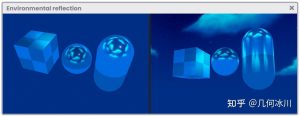目录索引
译文
这两种绘制器在处理数字范围和精度时非常有用,比如我们可以用指数滑条(PowerSlider)非线性地控制曲线。
指数滑条的声明语法如下所示:
[PowerSlider(3.0)] _PropertyName ("Display name", Range (0.01, 1)) = 0.08整数范围(IntRange)“人如其名”,是一个返回整数的范围。它的声明语法如下所示:
[IntRange] _PropertyName ("Display name", Range (0, 255)) = 100注意一下,如果我们想在着色器中使用这两种绘制器,我们可以直接在 CGPROGRAM 语义块中声明它们的连接变量。为了方便各位理解,让我们来看看下面的例子:
Shader "InspectorPath/shaderName"
{
Properties
{
// declare drawer
[PowerSlider(3.0)] _Brightness ("Brightness", Range (0.01, 1)) = 0.08
[IntRange] _Samples ("Samples", Range (0, 255)) = 100
}
SubShader
{
Pass
{
CGPROGRAM
…
// generate connection variables
float _Brightness;
int _Samples;
…
ENDCG
}
}
}在上面的例子中,我们声明了一个叫做“_Brightness”的指数滑条和一个叫做“_Samples”的整数范围,接着我们在 CGPROGRAM 语义块中用相同的名字声明了它们的连接变量。
原文对照
These drawers are quite useful when working with numerical ranges and precision. On the one hand, we have the PowerSlider, which allows us to generate a non-linear slider with curve control.
Its syntax is as follows:
[PowerSlider(3.0)] _PropertyName ("Display name", Range (0.01, 1)) = 0.08On the other hand, we have the IntRange which, as its name says, adds a numerical range of integer values.
Its syntax is as follows:
[IntRange] _PropertyName ("Display name", Range (0, 255)) = 100Note that, if we want to use these properties within our shader, they have to be declared within the CGPROGRAM in the same way as a conventional property. To understand how to use it, we will do the following operation:
Shader "InspectorPath/shaderName"
{
Properties
{
// declare drawer
[PowerSlider(3.0)] _Brightness ("Brightness", Range (0.01, 1)) = 0.08
[IntRange] _Samples ("Samples", Range (0, 255)) = 100
}
SubShader
{
Pass
{
CGPROGRAM
…
// generate connection variables
float _Brightness;
int _Samples;
…
ENDCG
}
}
}In the example above, we declare a PowerSlider called _Brightness and an IntRange called _Samples. Finally, using the same names, we generate our connection variables within the CGPROGRAM.

![[udemy]在 Unity 中创建 RPG 游戏的终极指南-软件开发学习笔记](https://gamedevfan.cn/wp-content/uploads/2025/04/TheUltimateGuidetoCreatinganRPGGameinUnity.webp)
![[udemy]学习在 Unity 和 C# 中创建吸血鬼幸存者风格的游戏-软件开发学习笔记](https://gamedevfan.cn/wp-content/uploads/2025/04/LearnToCreateAVampireSurvivorsStyleGameinUnityC.webp)
![[udemy] 在 Godot 4 中创建完整的 2D 幸存者风格游戏-软件开发学习笔记](https://gamedevfan.cn/wp-content/uploads/2025/05/CreateaComplete2DSurvivorsStyleGameinGodot4.webp)
![[gamedev tv] RPG核心战斗力的创造者 :学习中级 Unity C# 编码-软件开发学习笔记](https://gamedevfan.cn/wp-content/uploads/2025/04/RPGCoreCombatCreatorLearnIntermediateUnityCCoding.png)
![[gamedev tv]Unity 2.5D 回合制角色扮演游戏-软件开发学习笔记](https://gamedevfan.cn/wp-content/uploads/2025/05/Unity2.5DTurn-BasedRPG.webp)




暂无评论内容